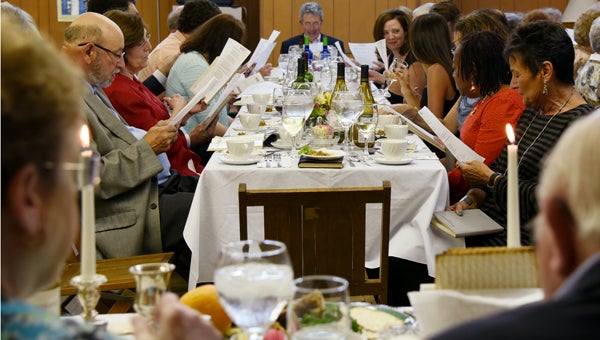Temple B’Nai Israel to host traditional Seder feast to help raise funds
Published 1:04 am Saturday, April 1, 2017

- Residents and members of Temple B'nai Israel celebrate the Seder supper. This year's Passover Seder Supper will be April 1 at Trinity Church. (file photo)
By Christian Coffman
NATCHEZ — Temple B’Nai Israel members will host a traditional Jewish feast of Seder next Saturday.
The event will serve as a fundraiser for the temple.
Seder is a Jewish feast day that marks the beginning of Passover, an eight-day holiday.
Because of impromptu planning, Passover for the Temple B’Nai Israel will begin on April 8 instead of April 10, when it normally begins.
A Seder, meaning “order” in Hebrew, is the ceremonial meal that is the focal point of Passover.
Longtime temple member Beau Bumgardner, who is helping host the dinner, has made it his business to keep the temple maintained in any way he can.
“The Jewish community is small in influence compared to the past in Natchez,” Bumgardner said. “As it’s dwindled, the temple’s upkeep has fallen onto fewer shoulders.”
To support the temple’s preservation efforts, the temple asks for a $30 donation, which includes the meal and wine.
“It’s not a expensive meal at all, really,” Bumgardner said. “This is money that’s a fundraiser for the building’s preservation.”
Members of the congregation will host the event and the dinner is open to everyone, including members of other faiths.The story of Exodus —the Jews’ escape from Egypt to their freedom under the guidance of Moses — is told during the dinner, as well as the 15 steps of how Seder is celebrated out of a prayer book called the haggadah, meaning “the telling.”
“If you can imagine Thanksgiving and Christmas rolled into one, that’s like what Passover is to us,” Bumgardner said.
Seder also serves as a teaching experience for children, Bumgardner said, since the story of Exodus is told to benefit young people about Jewish history.
The meal itself is centered on the Seder plate, which has ceremonial foods associated with with Exodus.
Foods on the plate are symbolic, and include matza, karpus and saltwater as a condiment.
Saltwater is representative of tears shed by the Jews over the bitterness of slavery. Karpus is a dish of greens. Matza is unleavened bread, indicative of the haste in which the Jews had to leave Egypt.
“Unleavend bread is not a delicious food, but it’s incredibly symbolic,” Bumgardner said.
Haroset is a dessert that is served and signifies the mortar the Hebrews made bricks out of while they were slaves. The dish is made of apples, honey, wine and raisins or dates.
Near the end of the meal, the cup of Elijah is brought out and filled with wine. Tradition has it that Elijah — a prophet and miracle worker — will come to a seder dinner and announce the arrival of the Messianic Age.
The goblet is placed for Elijah’s use and a child is given the honor to open a door, to be left open in case Elijah appears.
Temple B’Nai member Elise Rushing has hosted the Seder in the past, and said despite the dwindling Jewish population in Natchez, the feast always brings people to the temple.
“It’s almost like a homecoming,” Rushing said. “Many children that move away come back to visit for the Seder dinner.”
Bumgardner said Seder has been a tradition in Natchez for approximately 160 years.
“I think the dinner is a celebration of freedom,” Bumgardner said. “It’s basically a celebration that we can worship in a free country, to be free to practice our religion, which goes well with the message of Passover.”
Seder is set for 6 p.m. April 8 in the vestry room below the sanctuary at Temple B’Nai Israel on Commerce Street. Rushing said limited seats are available for the Seder dinner and encourages those interested to make reservations by calling Bumgardner at 504-812-4148.
“We wouldn’t have as many people show up for the dinner if it weren’t for the general community taking an interest,” she said.





